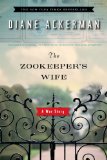Summary | Excerpt | Reading Guide | Reviews | Beyond the Book | Readalikes | Genres & Themes | Author Bio

A War Story
by Diane Ackerman
Heck agreed, aspiring to nothing less than recasting Germany’s natural world,
cleansing it, polishing it, perfecting it. A true believer from the first
stirrings of Nazism, Heck ingratiated himself with the SS, imbibed Fischer’s and
Lorenz’s beliefs about racial purity, and became a favorite with Hitler and,
especially, Hermann Göring, his ideal patron. In this sanitary utopia, Heck’s
job, essentially, was to reinvent nature, and he found Göring a generous patron
with deep pockets. In return, Heck wanted to give Göring dominion over Poland’s
greatest natural treasure, the fantastic lost-in-time preserve on the
Polish-Belarussian border, Bial/owiezÿa. As Heck appreciated, it made the
ultimate gift for a man who stamped his coat of arms on most possessions and
liked to dress in "pseudomedieval outfits of long leather jerkins, soft top
boots, and voluminous silk shirts, and go marching around his house and estate
carrying a spear." Many aristocrats held key positions in the Nazi Party and
most of the high command owned hunting lodges or estates, so an important facet
of Heck’s job was bagging the best hunting preserves and stocking them in novel
ways. Dotted with medieval castles, inheritor of Europe’s only primeval forest,
Poland boasted some of the finest hunting on the continent. Prewar photographs
place Göring at his sumptuously appointed hunting lodge northeast of Berlin, on
an estate stretching to the Baltic, complete with a 16,000-acre private preserve
which he stocked with elk, deer, wild boar, antelope, and other game animals.
More broadly, the Nazis were ardent animal lovers and environmentalists who
promoted calisthenics and healthy living, regular trips into the countryside,
and far-reaching animal rights policies as they rose to power. Göring took pride
in sponsoring wildlife sanctuaries ("green lungs") as both recreation and
conservation areas, and carving out great highways flanked by scenic vistas.
That appealed to Lutz Heck as it did to many other world-class scientists, such
as physicist Werner Heisenberg, biologist Karl von Frisch, and rocket designer
Wernher von Braun. Under the Third Reich, animals became noble, mythic, almost
angelic—including humans, of course, but not Slavs, Gypsies, Catholics, or Jews.
Although Mengele’s subjects could be operated on without any painkillers at all,
a remarkable example of Nazi zoophilia is that a leading biologist was once
punished for not giving worms enough anesthesia during an experiment.
Reprinted from The Zookeeper's Wife by Diane Ackerman. Copyright (c) 2007 by Diane Ackerman. With permission of the publisher, W.W. Norton & Company, Inc.
Your guide toexceptional books
BookBrowse seeks out and recommends the best in contemporary fiction and nonfiction—books that not only engage and entertain but also deepen our understanding of ourselves and the world around us.